Hi Everyone,

I continue my solutions series by discussing crime. This post will contain both logical arguments as well as my own opinions in regards to methods of tackling crime. Even though, crime is an area that has been heavily discussed in literature, real life application has generally not provided good results.
What is a crime? Every country has a list of activities they consider crimes. An activity is considered a crime if it violates criminal law. Some form of authority generally handles crime. For many countries, law making involves several groups of authority. One group makes the law, one group implements the law and another group interprets the law. It is possible that almost any action could be considered a crime if it is interpreted as breaking a criminal law.
This post will not discuss what actions should or should not be considered a crime; that is a topic for my dark side series. Instead, I will assume crimes, in essence, involve someone doing harm to others. It could be direct physical harm such as assault or murder. It could be indirect through taking or damaging of property. It could involve exploitation of a person’s vulnerabilities such as selling addictive substances.
Prevent, Fix, or Manage
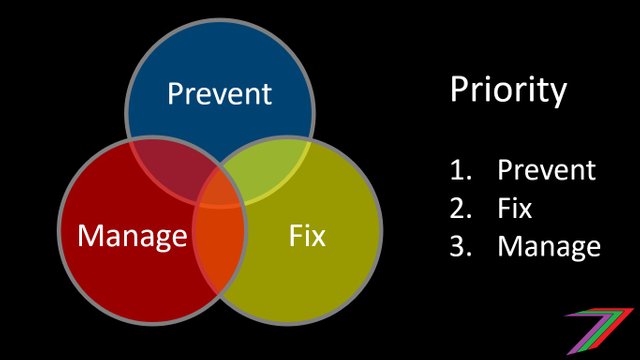
The Prevent, Solve or Manage approach that I describe in my post Prevent, Solve or Manage could be applied to crime. I still believe the priority of approaches should be ‘prevent’, followed by ‘solve’ and finally followed by ‘manage’. For the purpose of this post, I will use the word ‘fix’ instead of ‘solve’. I have made this change so as not confuse solving crime as a problem with solving an actual crime.
Preventing crime through understanding the causes
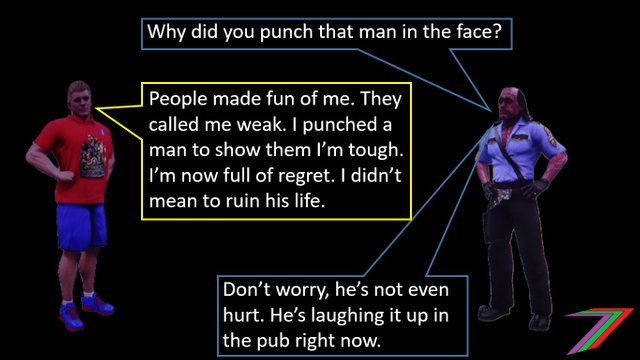
In order to prevent something from happening we need to know the causes of the problem. Why do people commit crimes? A person could commit a crime as an attempt to better their own position (i.e. acquire more wealth or power) because of these actions other people are hurt. A person could commit a crime to hurt another person deliberately (i.e. out of rage, jealously, mental illness, stress, brainwashing or revenge). These groups could be broken down further. For example, a person may steal because they have insufficient wealth to meet their needs. A person may steal because they have a greed for more wealth even though they are living comfortably. A person may steal because they need to feed an addiction. The method of prevention depends on the causes.
The BBC Guide to Crime, considers both individualist and collectivist positions on crime. In short, an individualist position considers the responsibility of a crime to belong with the individual committing the crime. A collectivist position considers criminal behaviour to be caused by circumstances and inequality in society. It is likely that both positions are valid to a certain extent. The only way to understand why people commit crimes is to understand the people that have committed the crime. The more we know about the causes of crime, the more that can be done to tackle the causes and therefore prevent the need for the crime to ever take place.
Prevention through precaution and defence
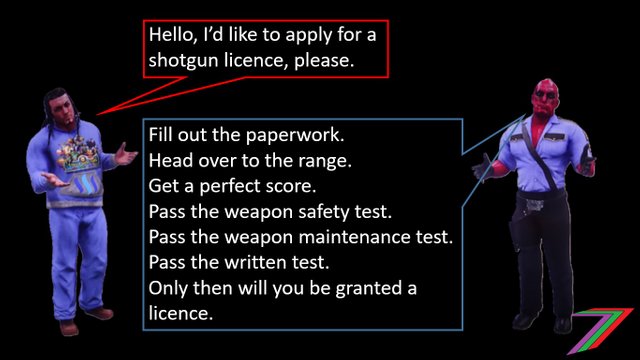
I believe tackling the causes of crime is the first step to stopping crime. However, crime can be prevented through our own actions. We can ensure our belongings and property are kept safe by keeping them locked up. We can make it a point not to tempt people by openly displaying our wealth. We can avoid dangerous places at dangerous times. We can form a community/neighbourhood watch group. We can learn self-defence or acquire a weapon.
I consider acquiring a weapon for self-defence to be quite an extreme response. However, some people find owning a weapon such as a gun necessary for their peace of mind. Different countries have different gun laws but the information I have found is very vague. Therefore, I will reference my own knowledge around guns to present my opinions. I was in the military for 2 ½ years as part of my National Service in Singapore. I believe gun ownership should require a licence and I believe the requirements should be strict. I believe the process should be very similar to obtaining a driving licence. I believe that if someone wants to own a gun, he or she needs to pass a series of tests. Such tests should involve obtaining a particular score at the range. The type of targets, distance and score will depend on the category of the gun licence. The person needs to have thorough knowledge of gun maintenance and safety. A gun is a dangerous weapon and should not be put in the hands of someone who is not highly skilled at using it.
How can crime be fixed?
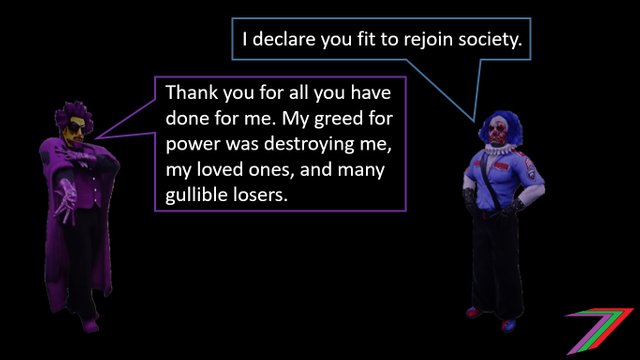
Some crimes will be committed regardless of the amount of effort used to prevent them. Once a crime has been committed, we have culprit/s and victim/s. ideally, the culprit/s should compensate the victim/s for the damage and suffering they have caused. However, an exchange of money might not be possible or appropriate for some crimes. Even if direct compensation to the victim is possible, some form of action is required to prevent the culprit from perpetrating the crime or other crimes again. Most countries prevent further crimes by imprisoning or executing the culprit.
I consider both imprisonment and execution to be deeply flawed approaches to preventing someone from committing more crimes. Execution is effective at preventing repeat offenses but it is an extreme approach to handling a criminal. A wrong conviction cannot be overturned once a person has been executed.
In my post Obedience, I discuss the ineffectiveness of imprisonment.
According to the National Institute of Justice, based on data from 2005, 68% of released prisoners are arrested within 3 years, 79% within 6 years, and 83% within 9 years. The above numbers are for the United States of America, which has a very high percentage of its population in prison. Approximately 0.66% of the America population are behind bars (CNN); that is approximately 2.2 Million people.
Keeping a person in prison is also costly to society. According to a 2017 article on marketplace.org, the average cost per inmate in the USA is US$31,000 and in some prisons it is as high as US$60,000. Therefore, imprisonment is both costly and ineffective.
If imprisonment is ineffective and expensive and execution is radical and irreversible, what else can be done to reform criminals? If a person is dangerous to those around them, they should be removed from society until they no longer pose a threat. This approach would involve temporary imprisonment. An article from Freedom Magazine, discusses a program of reform that has been quite successful. The program involves discovering and addressing the factors that caused the criminal behaviour. This approach also feeds into prevention as discussed earlier in this post.
Sentencing and justice
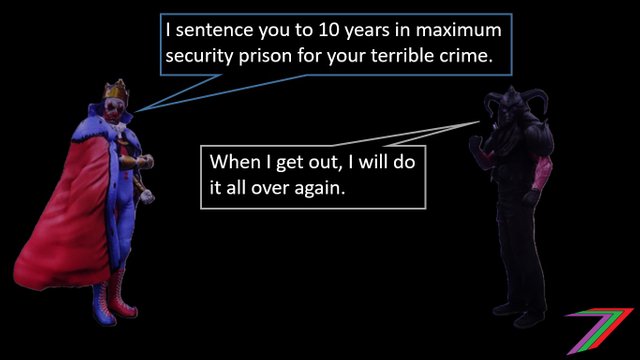
Different crimes have different sentences. More serious crimes generally have longer or more severe sentences than minor crimes. Repeat offenders generally receive longer and more severe sentences than first time offenders. Sentencing is often based on what is perceived as justice with limited link to reform. Releasing someone because he or she has reached the end of their sentence without evidence they have reformed is ridiculous. Holding someone in prison who is no longer a danger to society is also ridiculous. A structured reform program is a far more logical approach.
I consider ‘Justice’ a state enforced system of revenge used to punish people that do not obey the state. If we want to genuinely reduce crime and create a safer environment. We need a system built on the right intentions. We do not need a system that punishes maliciously out of spite for not obeying authority. We do not need a system that focuses on punishing minor crimes committed by impoverished minorities. Is there a real incentive to reduce crime, when higher crime rates are likely lead to higher funding of the 'Justice' system?
Managing crime
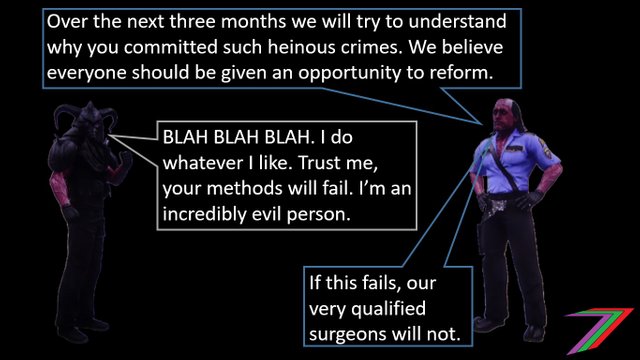
Ideally, crime should be prevented. When crimes occur, the culprit/s should compensate the victim/s for their loss. Criminals should also undergo some form of reform so that they are no longer a threat to those around them. What should be done if a criminal cannot be reformed, or if a reform program fails and the criminal returns to committing crimes. Should they undergo another reform program? Should they be imprisoned for life? Should they be lobotomised? Should they be physically altered so that they are unable to recommit similar crimes? Should they be executed? Should they be exiled? I do not have an answer in this post. I believe the nature of the crimes will be an important factor in determining the next action.
Private Sector vs. Public Sector

Who should play the bigger role in handling crime, the private sector or the public sector? I believe that the public sector has the bigger role in most countries. However, the private sector contributes by providing security services, developing technology, and even running prisons. There is a market for safety and security, therefore, the private sector is able to provide it. However, a criminal justice system (I would prefer crime prevention and reform system) is a public good. It is not excludable, i.e. the system should cover everyone regardless of who pays. Therefore, a publicly funded crime prevention and reform system is a more logical approach than a private crime prevention and reform system. Reform programs, in particular, are a social service. They should be designed to benefit the criminal and society as a whole.
If a crime prevention and reform system cannot be addressed by the market, how else could it be funded? At the moment, public funding might be the only realistic source; I briefly discuss an alternative funding source in the summary of this post. This funding could come from tax revenue, fines, or even newly printed money. The focus should be on reducing crime. This should eventually reduce the required funds needed to support a prevention and reform system.
Summary

Crime is a difficult problem to solve. It is easy to establish what is not effective but it is difficult to propose an alternative that will be effective. I believe the focus needs to be on understanding why people commit crimes. This will help prevent crimes by enabling the targeting of the root causes of crimes. This will also provide an input into reforming criminals that have committed crimes because of causes that could be eliminated.
An approach, which involves cooperation between the private and public sector, is possible. The private sector can provide services and products to improve security. The public sector can fund reform, crime prevention, and crime solving services. The public sector could outsource these services to the private sector. The private sector could provide technology and expertise.
Could the blockchain be used to help fund or support a crime prevention and reform system? The blockchain can be used as an open source database that can help crime stoppers understand the causes of crime. Funding could also be possible through newly created cryptocurrency (inflation). Distribution of the funding could be based on the expertise of those elected through a blockchain mechanism. Those elected would be rewarded based on their effectiveness at reducing crime rather than funded based on past inefficiencies. These are just some rudimentary ideas. I will explore these sorts of ideas in more detail in another post.
More posts

If you want to read any of my other posts, you can click on the links below. These links will lead you to posts containing my collection of works. These posts will be updated frequently.
Guide to the Steem Ecosystem (Udemy Course)

I have launched my Udemy course ‘Guide to the Steem Ecosystem’. This course takes you on journey through the Steem Ecosystem. The course consists of 6 sections. These sections are as follows:
- Getting Started
- Navigating Steem Frontends
- Becoming a Steem User
- Behind the Scenes
- The Wonders of the Steem Ecosystem
- Additional Content (SteemFest 4, SMTs, Communities, etc.)
The course contains 56 video lectures (about 13.5 hours of viewing), 56 multiple-choice questions (10 to 12 at the end of each section), and 59 downloadable resources (presentation slides and additional material such as white and blue papers). The course is free-of-charge. Click the link above to access the course.
I also have an economics course, titled Economics is for Everyone, which contains about 4 hours of video content.




Steem - The Future of DApps





Congratulations. We love your post because it's so well written and visually stunning, and we'd love to see it hit the Trending pages of Steem. Our project aims to generate support for posts just like yours!
#trendgineering #trending
Photo Courtesy of Canva
What do you think @theycallmedan, @twinner, @superhardness, @postpromoter, @adsup, @redpalestino, @trafalgar, @blocktrades, @acidyo, @smooth, @azircon, @michealb, @tombstone and whoever else notices this? Spread the word!
@trendthis was founded by @joshman. If you were mentioned and wish not to participate, simply reply to this post stating so. A special thank you to collaborators @azircon, @livinguktaiwan, @minismallholding, @riverflows. Of course this could not be done without the generous support of our participating Orcas and Whales!
Project Supporter: @ocd / @ocdb / @acidyo
Project Supporter: @ steemflagrewards / @enforcer48 / @anthonyadavisii
Downvoting a post can decrease pending rewards and make it less visible. Common reasons:
Submit
Thanks for the awesome support.
Downvoting a post can decrease pending rewards and make it less visible. Common reasons:
Submit
I guess in more advanced countries I've seen many applications of human relations and psychology in tackling crime, sometimes it even helps in preventing crimes that would be really disastrous, I feel it's sometimes a system that is put in place, run by a group of personnel and others so I feel that public sector handling the tackling of crime might be better not to it's the best but still better than the private sector unless of course there will be joint duties, I don't know how it works in other countries, but it's the public that handles it in my country. I enjoyed reading. Cheers
Downvoting a post can decrease pending rewards and make it less visible. Common reasons:
Submit
In every country that I have been to, crime has been predominately handled by the public sector. However, they haven't done a particularly good job and it has remained a pressing problem. The private sector is unlikely to be able to do a good job as there are too many social elements that the private sector do not have adequate incentive to address.
I mention at the end of the post that I believe a blockchain solution might be possible. I think it is an approach worth exploring.
Downvoting a post can decrease pending rewards and make it less visible. Common reasons:
Submit
Definitely I did see that, and I was busy rummaging my mind on how blockchain can be really incorporated seeing it's unpopularity, into handling some of these dicey issues. I guess in the future this can be handled.
Downvoting a post can decrease pending rewards and make it less visible. Common reasons:
Submit
I doubt a blockchain solution is going to be possible in the near future but the possibilities for the blockchain are insane. I am guessing in 10 years we will be seeing things using blockchain technology that we can't even imagine today.
Downvoting a post can decrease pending rewards and make it less visible. Common reasons:
Submit
Congratulations @spectrumecons! You have completed the following achievement on the Steem blockchain and have been rewarded with new badge(s) :
You can view your badges on your Steem Board and compare to others on the Steem Ranking
If you no longer want to receive notifications, reply to this comment with the word
STOPVote for @Steemitboard as a witness to get one more award and increased upvotes!
Downvoting a post can decrease pending rewards and make it less visible. Common reasons:
Submit
Hi @spectrumecons!
Your post was upvoted by @steem-ua, new Steem dApp, using UserAuthority for algorithmic post curation!
Your UA account score is currently 5.056 which ranks you at #1099 across all Steem accounts.
Your rank has dropped 4 places in the last three days (old rank 1095).
In our last Algorithmic Curation Round, consisting of 87 contributions, your post is ranked at #10.
Evaluation of your UA score:
Feel free to join our @steem-ua Discord server
Downvoting a post can decrease pending rewards and make it less visible. Common reasons:
Submit
Hi, @spectrumecons!
You just got a 1.18% upvote from SteemPlus!
To get higher upvotes, earn more SteemPlus Points (SPP). On your Steemit wallet, check your SPP balance and click on "How to earn SPP?" to find out all the ways to earn.
If you're not using SteemPlus yet, please check our last posts in here to see the many ways in which SteemPlus can improve your Steem experience on Steemit and Busy.
Downvoting a post can decrease pending rewards and make it less visible. Common reasons:
Submit
@tipu curate
Downvoting a post can decrease pending rewards and make it less visible. Common reasons:
Submit
Downvoting a post can decrease pending rewards and make it less visible. Common reasons:
Submit
This post was shared in the Curation Collective Discord community for curators, and upvoted and resteemed by the @c-squared community account.
If you are a community leader and/or contest organizer, please join the Discord and let us know you if you would like to promote the posting of your community or contest.
@c-squared runs a community witness. Please consider using one of your witness votes on us here
Downvoting a post can decrease pending rewards and make it less visible. Common reasons:
Submit